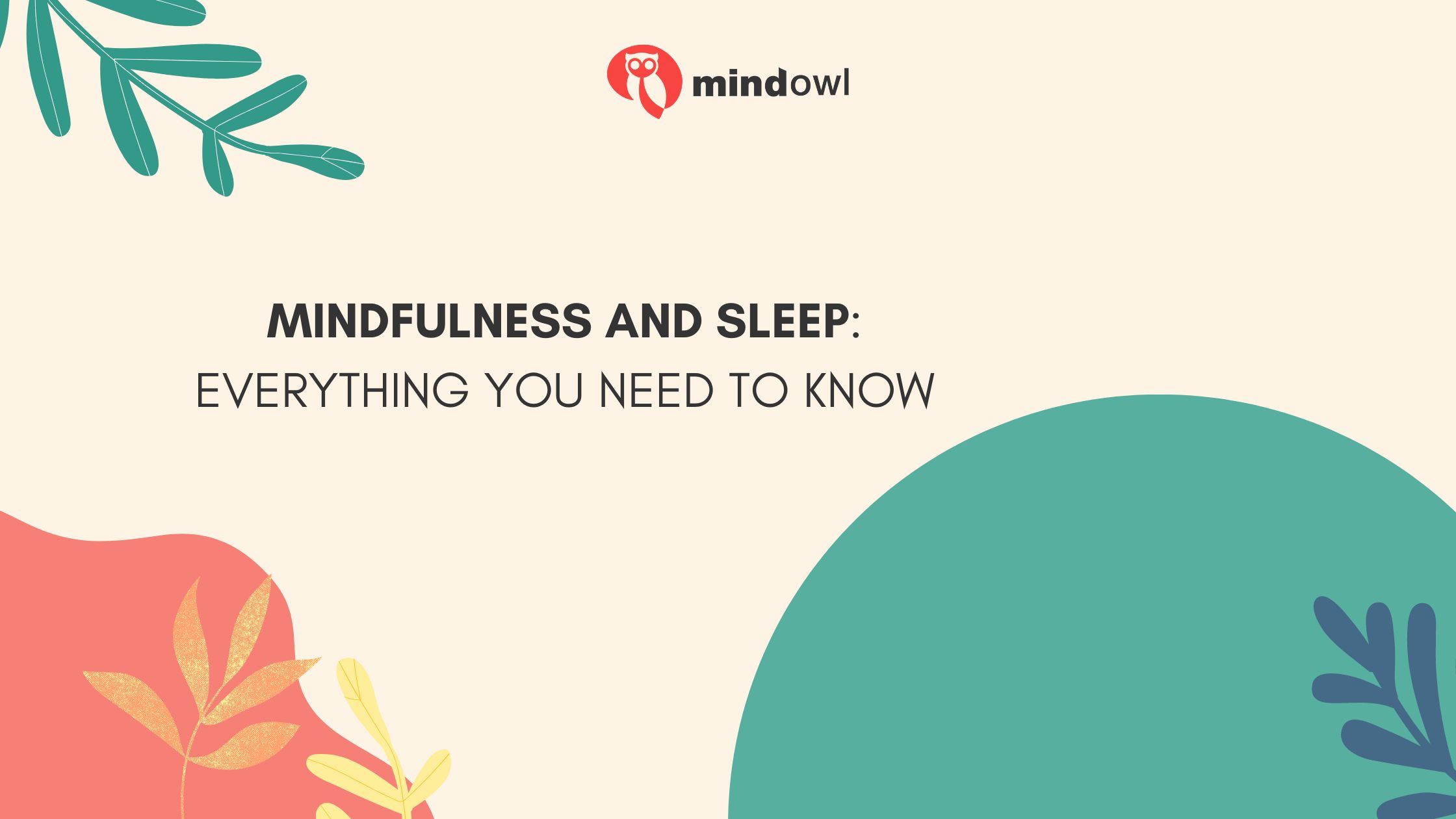
Struggling to find peace in the whirlwind of thoughts at bedtime is not uncommon. Research shows that bringing mindfulness into your evening ritual can significantly enhance sleep quality.
Our blog will guide you through practices that promise a more restful slumber, equipping you with the knowledge to drift off serenely. Discover tranquillity tonight.
Key Takeaways
- Mindfulness can help you sleep better by calming your mind and reducing stress.
- Doing mindfulness before bed, like breathing exercises or yoga, can make it easier to fall asleep and improve the quality of your rest.
- Consistent mindfulness practices in the morning set a good mood for your day and can lead to sleeping better at night.
- Good sleep makes a big difference in how well we get along with others.
- Studies show that people who practice mindfulness have less trouble with sleep disturbances.
Understanding Mindfulness for Better Sleep

Understanding the connection between mindfulness and sleep is crucial for improving sleep quality. Practicing mindfulness can help reduce stress, quiet the mind, and promote relaxation, all of which are essential for a restful night’s sleep.
The connection between mindfulness and sleep
Mindfulness and sleep are closely linked. Practicing mindfulness may lead to better sleep quality. This means people who do mindfulness exercises often find they can fall asleep faster and rest well through the night.
Mindfulness helps calm the mind, making it easier to drift off to sleep without tossing and turning with stressful thoughts.
Studies show that mindfulness meditation interventions have made a big difference in how well people sleep. People dealing with insomnia or those who wake up feeling tired might benefit from trying out some mindfulness before bed.
The practice guides your focus, lower stress, and this could mean fewer night-time worries keeping you awake.
Benefits of practicing mindfulness for sleep
Practising mindfulness for sleep can make a big difference in how fast you drift off and the quality of your rest. It targets your mind’s busy thoughts and helps relax them, making it easier to fall into a deep sleep.
Studies show that sticking to a regular mindfulness routine before bed can lead to less insomnia. You might find yourself sleeping through the night without waking up so often.
Another key benefit is that mindfulness meditation may calm emotions that stir up at bedtime. By focusing on the present moment, you let go of worries from the day or stress about tomorrow.
This peaceful state can help improve your overall sleep quality, leading to better energy levels and mood during the day. Regular practice could also mean saying goodbye to lying awake with racing thoughts; instead, welcome more nights of good rest.
Common dos and don’ts of mindfulness for sleep
Do try to clear your mind before bed. Mindfulness meditation helps by teaching you to let go of worries and just be in the moment. It can make it easier for you to fall asleep. Use guided meditations or bedtime yoga if you’re new to mindfulness, as these can guide you into a relaxed state.
Don’t look at screens right before sleep, as the light can wake up your brain. Make sure not to drink caffeine too late in the day or eat big meals close to bedtime either. These things disturb your sleep more than help it.
Keep a regular schedule and use mindfulness practice each night to teach your body when it’s time to rest.
Ways to Wind Down for Better Sleep with Mindfulness

To wind down for better sleep with mindfulness, you can try simple tips to calm a stressed mind and promote sleep. This includes guided meditations, bedtime yoga, and mindful movement that can help relax your body and mind before bedtime.
Simple tips to calm a stressed mind and promote sleep
Breathing slowly and deeply can make your body feel calm. Try this before bed to help you sleep better. Imagine a place that makes you happy and peaceful. This is called guided imagery, and it helps your mind relax so you can drift off to sleep.
Doing meditation or yoga can also quiet a busy mind at night. These practices ease your thoughts and make your body ready for sleep. Stick with them every day, and they may improve how well you sleep over time.
Remember, even just a few minutes of these calming activities can lead to a good night’s rest!
Guided meditations, bedtime yoga, and mindful movement
Moving on from calming techniques, consider incorporating guided meditations, such as the Neuro Balance Therapy program, to facilitate better sleep. Close your eyes and listen as a calm voice leads you through relaxing scenes or thoughts. This type of meditation can make it easier to let go of the day’s worries.
Yoga before bed is another great choice. Gentle stretches and poses calm your body and get it ready for sleep. Mindful movement like this can ease tension and make you feel more peaceful.
You could also try slow movements that focus on your breath. These simple actions help clear your mind so that sleep comes more naturally. Let each calming breath prepare you for a good night’s rest, setting the stage for improved sleep quality associated with mindfulness practices.
Practice these activities regularly, and they may become a helpful part of getting ready for bed each night.
Morning Mindfulness for a Strong Start to the Day
Incorporating mindfulness into your morning routine can help set a positive tone for the rest of the day. By starting your day with mindful practices, you can cultivate a sense of calm and focus that can carry through to all your activities and interactions.
Incorporating mindfulness into your morning routine
Wake up to a calmer day by adding mindfulness to your mornings. This practice can turn the start of your day from hectic to peaceful. Simple exercises like deep breathing or picturing a tranquil scene help relax your body and mind.
You could also try gentle stretches to wake up your muscles while keeping your thoughts present and focused.
Doing these things sets a positive mood for what’s ahead. It slows you down so you can enjoy now, which makes you happier over time. With everyone rushing in the morning, taking this time for yourself is an act of self-care that benefits both mental and physical health.
Next, let’s explore how good sleep strengthens relationships..
How it can set the tone for the rest of the day
Bringing mindfulness into your morning routine does wonders. It offers a peaceful start with lots of energy and sharp focus. This good feeling can last all day long. Even a short meditation in the morning cuts down stress and worry.
Your mind stops going over the same old problems. You feel ready to make this day great.
A quick five-minute meditation when you wake up can change your whole day. You get to take control right from the start with a powerful routine that makes you feel strong and happy inside.
The rest of your hours are shaped by this calm beginning, helping you sleep better at night too.
The Relationship Between Sleep and Relationships
Quality sleep can greatly impact our relationships, as it affects our mood, energy levels, and overall well-being. Improving sleep can lead to healthier, more positive interactions with loved ones and colleagues alike.
How quality sleep can benefit your relationships
Quality sleep is important for our relationships. Research shows that good sleep can lead to improved social interactions and better emotional regulation. When we are well-rested, we are more patient, empathetic, and able to communicate effectively with others.
Also, sleeping next to a partner might result in longer sleep duration and higher sleep efficiency. Therefore, by prioritising quality sleep, we can enhance not only our own well-being but also the quality of our relationships.
Investing in good sleep habits can contribute positively to how we relate to others on a daily basis. By getting enough rest at night, we are better equipped to handle stress and manage our emotions during social interactions.
Tips for improving your sleep for healthier relationships
Improve your sleep to strengthen your relationships. Stick to a consistent sleep schedule, even on weekends. Go to bed and wake up at the same time every day. This helps regulate your body’s internal clock, supporting better sleep quality and duration.
Reduce screen time before bed. The blue light emitted by phones, tablets, and computers interferes with the production of melatonin, a hormone that regulates sleep. Instead, unwind with calming activities like reading or gentle stretching to prepare your mind for restorative sleep.
Incorporating Mindfulness into Family Routines
Encouraging mindfulness in family routines can foster a sense of calm and connection, benefiting everyone’s mental well-being. From simple breathing exercises to mindful activities, there are many ways to make mindfulness an integral part of your family’s daily life.
Benefits of practicing mindfulness as a family
Practicing mindfulness as a family offers numerous benefits, including reducing stress and enhancing both mental and physical health. It has been found that incorporating mindfulness into family routines can lead to lower anxiety and depression levels for all members.
Moreover, it can result in improved sleep quality and decreased blood pressure for both parents and children. Additionally, mindful practices have been linked to better academic performance for students and parents alike, showcasing the far-reaching positive impact of mindfulness within the family unit.
It’s also worth noting that embracing mindfulness collectively promotes enhanced mood, reduced stress levels, and improved emotional regulation for the entire family. Furthermore, it can contribute to better memory retention, heightened concentration abilities, and increased flexibility among family members – underscoring the holistic advantages of practicing mindfulness together as a unit.
Ways to make mindfulness a part of your family’s routine
Incorporating mindfulness into your family’s routine can start by setting aside time for simple activities like deep breathing or quiet reflection. You can integrate it during meal times, focusing on the taste and texture of food, or even while engaging in a shared hobby.
Another way is to establish a regular bedtime ritual that involves calming activities such as reading a book together or doing gentle stretches. By incorporating these small mindfulness practices into your family’s day, you can create moments of connection and relaxation for everyone.
You might also want to consider using technology to help with mindfulness; there are many apps designed specifically for families that offer guided meditations and other mindful activities suitable for both children and adults.
Research on the Effects of Mindfulness on Sleep
Numerous studies have shown the positive impact of mindfulness on sleep quality, with evidence suggesting that mindfulness meditation interventions significantly improved sleep quality compared with non-specific active treatments.
Additionally, preliminary findings suggest that mindfulness meditation may be effective in treating some aspects of sleep disturbance.
A clinical perspective on the benefits of mindfulness for sleep
Research has shown that mindfulness meditation can be effective in addressing certain aspects of sleep disturbance. It is suggested that mindfulness practices promote metacognitive awareness and reduce rumination, thus leading to improved sleep quality.
Recent studies indicate a positive link between higher trait mindfulness and better sleep quality, revealing the potential benefits of incorporating mindfulness into daily routines.
Additionally, evidence suggests that mindful movement practices like tai chi may contribute to enhancing sleep quality, especially in older adults.
The application of mindfulness-based stress reduction techniques has also been associated with improvements in sleep. Preliminary findings propose that mindfulness meditation could be an effective approach for treating various dimensions of sleep disruption.
Studies and findings on the subject
Mindfulness meditation has shown promise in addressing sleep issues. Research indicates a positive link between mindfulness and improved sleep quality, with potential benefits for emotion regulation and resilience.
Furthermore, low levels of mindfulness have been associated with poorer sleep quality. Studies suggest that practicing mindfulness regularly can lead to better sleep outcomes across various measures.
Additionally, mindfulness has demonstrated effectiveness in reducing rumination, which can be beneficial for promoting restful sleep.
Based on evidence, it seems that incorporating mindfulness practices into one’s routine may offer tangible improvements in addressing certain aspects of sleep disturbances and enhancing overall sleep quality.
Conclusion and Next Steps
After learning about the connection between mindfulness and sleep, as well as the benefits of incorporating mindfulness into your daily routine, it’s time to take the next steps towards better sleep.
Whether you decide to try guided meditations, bedtime yoga, or simply practice being mindful throughout your day, there are plenty of resources and tips available to help you on your journey to improved sleep quality.
Explore additional resources and consider how you can incorporate mindfulness into your own routine for a better night’s rest.
Additional resources and tips for incorporating mindfulness into your sleep routine
To incorporate mindfulness into your sleep routine, consider using apps like Headspace or Calm, which offer guided meditations specifically designed to promote better sleep. These apps provide a convenient way to access various mindfulness practices tailored for improving sleep quality.
Additionally, incorporating gentle bedtime yoga can help relax the body and mind, preparing you for a restful night’s sleep. By engaging in these activities consistently, you can gradually train your mind and body to wind down more effectively before bedtime, leading to improved overall sleep quality.
Another useful resource is the book “The Miracle of Mindfulness” by Thich Nhat Hanh, which offers insightful techniques and perspectives on incorporating mindfulness into daily life routines including sleep habits.
FAQs
1. Can mindfulness meditation improve sleep quality?
Yes, evidence suggests that mindfulness meditation can help improve your sleep by making it easier to fall asleep and enhance the overall quality of sleep.
2. What is a systematic review and meta-analysis in relation to sleep and mindfulness?
A systematic review and meta-analysis look at studies on how practising mindfulness or meditation impacts sleep, showing improvement in people’s ability to get a good night’s sleep.
3. How does meditation for sleep work?
Meditation helps with sleep by calming the mind through focusing on breath or guided imagery, which may make falling asleep easier.
4. Will any form of guided meditation help me if I can’t sleep?
Different types of guided meditations can assist you if you’re having trouble sleeping, helping to relax your mind for better rest at night.
5. Are there evidences that show mindfulness training improves issues with sleeping?
Studies reviewed through randomised controlled trials provide strong evidence that interventions like mindfulness training do indeed support improvements in those who have difficulty getting to sleep or staying asleep.
6. If I try app-based mindfulness exercises, could they help me get better rest at night?
App-based mindfulness practices offer convenient ways for individuals trying out different methods right before bed which might ease them into more peaceful slumber.
MindOwl Founder – My own struggles in life have led me to this path of understanding the human condition. I graduated with a bachelor’s degree in philosophy before completing a master’s degree in psychology at Regent’s University London. I then completed a postgraduate diploma in philosophical counselling before being trained in ACT (Acceptance and commitment therapy).
I’ve spent the last eight years studying the encounter of meditative practices with modern psychology.

